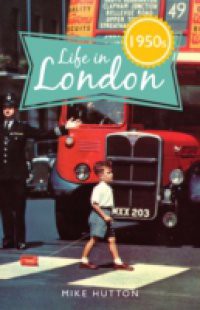After the trauma of the Blitz and wartime restrictions, London embraced the arrival of a new decade. Austerity was slow to loosen its grip, but the Festival of Britain pointed a tentative way forward. Two years later saw the birth of a new Elizabethan era that was greeted with an almost naive enthusiasm. This was a time when class still dominated and divided. Despite the introduction of the welfare state, grinding poverty still existed. The rich were also suffering under a barrage of punitive taxation. The artistic community set out to challenge the bounds of perceived decency. As always, London spearheaded change. Twin sets and pearls gave way to a new elegance in women s fashion, while young men ditched their cloth caps in favour of Teddy Boy suits. A new teenage culture arrived along with coffee bars and rock 'n' roll. To a background of grisly murders and organised crime, often shrouded in fog, London lurched into the unknown. It was loud, brash and chaotic, yet also sophisticated. A city of opportunity and dangerous temptation, it set the agenda for others to follow. Huge success and degrading humiliation were of passing interest only as the world s greatest city hurled itself restlessly forward seeking its next distraction.

